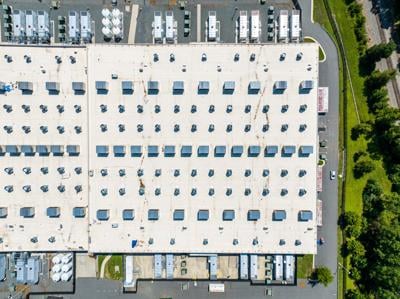The reelection of Donald Trump shows the continued prevalence of climate denialism, which involves a rejection of the scientific consensus that human activity is changing the climate. As in his first term, Trump will no doubt try to hold our country back in the race to slow climate change by phasing out fossil fuels.
Unlike Trump’s climate denialism, survey research indicates that we in Virginia largely agree that climate change is happening. And most of us understand that it is caused by our reliance on coal, oil, and natural gas. But we have our own special variety of denialism here in the commonwealth: a denial that there are limits to how much electricity we can produce for data centers without also shattering our commitment to shift away from fossil fuels. Ultimately, a transition to renewable energy will require that we slow or stop the current data center boom in order to get there.
Data center development and growing energy demand
The name “data center” sounds innocuous, but their need for energy is anything but harmless. Data centers are large warehouses stacked full of electronics that convert energy into data storage and computation, increasingly for artificial intelligence. The amount of electricity that data centers need is staggering. Just one data center can use as much power as tens of thousands of households combined.
With at least 500 data centers that have been built or permitted in Virginia, along with more in the works, the state has a higher data center density than anywhere else in the world. Even before the data center boom, a transition away from fossil fuels across the state to 100% renewable energy would be a daunting task. But thanks in large part to data centers, it is now much harder. Virginia is experiencing greater demand for power than any time since World War II. Electricity consumption in the state is projected to double in the next fifteen years.
The limits of green technology
This growing energy demand cannot be met while also phasing out fossil fuels. Solar panels are an essential part of the energy transition, but they can’t do it all. For example, just one 600 megawatt data center recently approved in Caroline County will use the equivalent of as much electricity as is produced in Spotsylvania County’s solar farm, which covers 3,500 acres of land with solar arrays and is the largest solar development east of the Rocky Mountains.
Wind turbines have tremendous promise for electricity production, but also can’t provide a magical solution for meeting energy demand. For example, Dominion Energy is developing a 176 turbine project off of the coast of Virginia Beach. This project will produce enough electricity to meet the needs of about 600,000 homes, or just a bit more than the energy that will be required to power a single data-center mega project that is currently being developed in Hanover County.
Due to the limits of solar and wind energy in meeting expected energy demand, Dominion Energy and Amazon Web Services — a main developer of data centers in our state — have announced plans to build small nuclear power plants as low-carbon sources of energy. But it would take dozens of these new reactors to produce enough electricity for Virginia’s data centers alone. Since nuclear power remains controversial and because many Virginians likely do not want to live next to a nuclear power plant, it is uncertain where they would all be built.
Climate denialism, Virginia style
Virginia’s style of climate denialism doesn’t dispute that fossil fuels are causing climate change. Instead, denialism in the commonwealth happens when we commit to phasing out fossil fuels but don’t have a plan to get there, and instead approve data center after data center as if there is an unlimited supply of low-carbon electricity to run them all.
Dominion Energy, for instance, says that it is committed to Virginia’s goal of phasing out fossil fuels, even while proposing the development of new natural gas power plants. Amazon Web Services stresses the importance of achieving carbon neutrality by 2040, even if its CEO admits that he doesn’t know how it will be achieved. And local leaders, like those in my hometown of Fredericksburg, proclaim their commitment to 100% renewable energy goals without a climate plan, while also announcing new efforts to attract data center development.
In order to overcome Virginia’s special flavor of climate denialism, we must recognize that there are limits to how much energy we can produce without fueling climate change. This means there is also a limit to how many data centers that can operate as we transition away from fossil fuels. In the interest of protecting our climate, it is time for a moratorium on the approval of new data centers in our state.
_____________________________________
Eric Bonds lives in Fredericksburg. He is a professor of sociology at the University of Mary Washington, where he teaches on the topics of human rights, climate change, and environmental justice. The views expressed here are his own, and are not reflective of UMW.



(2) comments
Under questioning, I bet it wouldn't take Virginia leaders very long to invoke either economic prosperity or national security or both in defense of the intensive and unfettered data center development. I get that even if that reality does not begin to excuse the utter lack of regard for communities and residents exhibited by so, SO many of these projects, especially in Prince William County. With that said, however, I absolutely don't understand why we are not acknowledging that the destruction and instability of climate disasters also threatens economic viability and national security. How many billions has Helene already cost? How much is that one storm still costing in both recovery and lost revenue? Are we safer when large numbers of people either within or outside of the country are violently or dramatically displaced or when local, state, and national governments are overextended dealing with natural disasters?
Compounding--that's what the effects of disaster upon disaster will be. For example, when your land sinks (subsidence) that makes your sea-rise flooding worse. That compounding dynamic has been known for decades--most people's whole lifetimes-- but yes, data centers, and really all economic development, transcend climate concerns in Virginia, like magic. Corporations and governments are talented illusionists, after all. If the claims by energy-intensive industries of being carbon neutral in just a few short years are not simply numbers games with carbon credits, then like the author, I would like to know where exactly all this green energy infrastructure is going to go and when. Scientists have said there is a timeline for avoiding the worst of the effects. What is the ETA on widespread neighborhood use of SMRs? Those small nuclear reactors are great for lowering carbon emissions. How many will we need? How much water do they use?
That to me may be the most important question, and why I would like to know what restoration projects have been implemented to support the tech industry’s claims of being water positive by 2030. Carbon may be the political crisis du jour, but water is life. Northern Virginia is the epicenter of Big Tech’s industrial development, so we must have the most water restoration projects, right? So what are they? And, does the industry take requests? Most of Northern Virginia is not only currently in severe drought but is also at emergency groundwater levels. (See drought maps below.)
https://www.deq.virginia.gov/our-programs/water/water-quantity/drought?utm_medium=email&utm_source=govdelivery
https://droughtmonitor.unl.edu/CurrentMap/StateDroughtMonitor.aspx?fips_51153
Furthermore, in large part from too much groundwater withdrawal, severe subsidence on the coastal plain of Eastern Virginia is threatening the state’s largest freshwater aquifer through saltwater intrusion, and the sinking land along with compacting our aquifer is threatening billions of dollars of transportation infrastructure and community development. Billions, just in Virginia, though the problem extends along the entire East Coast. So, if the tech industry is making us the epicenter of its industrial operations—and electricity generation is water-intensive and cooling systems can be too — and they are going to make their operations water positive by 2030, then that industry must already be shoring up the collapsing Potomac Aquifer System in Eastern Virginia right?
How about the Shenandoah River? Folks along its banks were under water restrictions for months last year, with no known alternative water source, and, of course, imposed water restrictions couldn’t prevent the wildfires in either Shenandoah National Park or a local wildlife refuge. Lost acres are another compounding effect. And since the Shenandoah River is a tributary to the Potomac, its recent historic lows indicate issues with our local river’s health as well. So, we’re already at least working on that localized restoration project, right? Cause it takes a while for these systems to recharge. Water positive by 2030, right?
One way or the other, I sure hope the JLARC study makes that happen.
https://www.usgs.gov/centers/virginia-and-west-virginia-water-science-center/science/land-subsidence-virginia-coastal
https://www.nbcwashington.com/news/local/virginia-declares-state-of-emergency-as-wildfire-burns-in-shenandoah-national-park/3464154/
As this opinion piece makes plain, there is no doubt that Virginia has stuck its head in the sand regarding the environmental risks associated with unconstrained data center proliferation.
It will be interesting to see if Virginia attempts to pull its head out and acknowledge the hole it has dug for itself when the Joint Legislative Audit and Review Commission releases its report on “Data Center in Virginia” on December 9th.
Welcome to the discussion.
Log In
Keep it Clean. Please avoid obscene, vulgar, lewd, racist or sexually-oriented language.
PLEASE TURN OFF YOUR CAPS LOCK.
Don't Threaten. Threats of harming another person will not be tolerated.
Be Truthful. Don't knowingly lie about anyone or anything.
Be Nice. No racism, sexism or any sort of -ism that is degrading to another person.
Be Proactive. Use the 'Report' link on each comment to let us know of abusive posts.
Share with Us. We'd love to hear eyewitness accounts, the history behind an article.